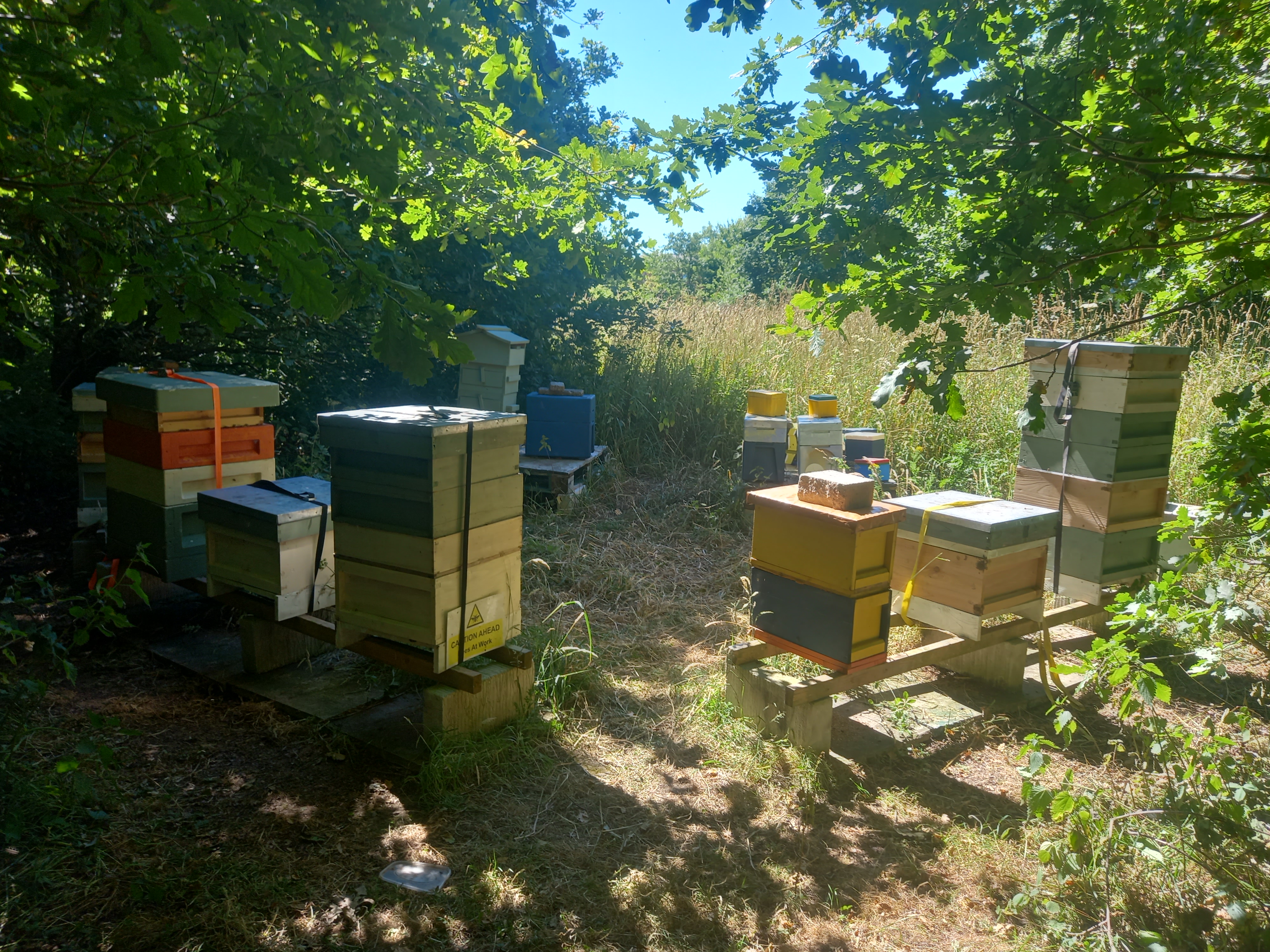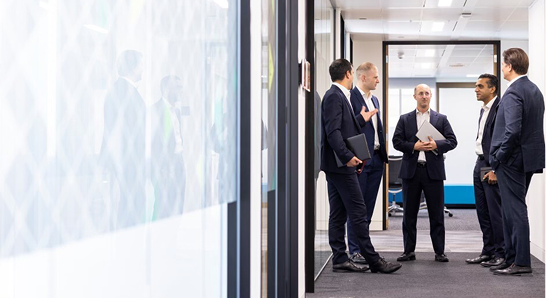Bees at Deeside Solar Farm: supporting life on land
.jpeg)
Biodiversity is the variety of life on Earth, from tiny microbes to century-old trees, with bees buzzing around somewhere in between. Animals and plants provide humans with everything needed to survive – including fresh water, food and medicines – but this can only be achieved by maintaining the delicate balance of animals and plants working and thriving together. As managers of a broad portfolio of renewable energy sites, we have a duty of care to the land our energy-generation assets inhabit, as well as the surrounding flora and fauna.
.jpeg)
We have made an active commitment to perform an ongoing programme of ecological site surveys to identify, refine and optimise our contribution to target 15 of the UN Sustainable Development Goals - Life on Land.
One example of our continued sustainability work is our biodiversity enhancement project plan for ground-mounted solar assets, which highlights species and habitats that require extra attention. One particular species is the honeybee, which we have been integrating into our solar sites for a number of years. Below is an update on successful activities at Deeside.
Deeside’s resident bees
Deeside Solar Farm, located in Flintshire, Wales, is fitted with a 3.7 MWp ground-mounted solar photovoltaic system (PV). This installation was commissioned in 2011 and annually supplies the estimated equivalent of 1165 UK homes. We also manage a smaller 50 kWp system at the same site.
In August 2022, five beehives of European honeybees – consisting of approximately 20,000 worker bees per hive and a newly-mated queen bee in each hive – made the three+ mile journey from the south of Chester to their new home in Deeside.
Each of these bees has a life span of six weeks and less than 1/8th of a teaspoon of honey to their name; this emerging brood of workers began the critical task of surviving until the beginning of Spring and keeping the queen alive and warm through honey-powered heating – the action of worker bees vibrating to generate warmth. Four out of the five original hives made it to March 2023 with reasonable stores of honey. As the numbers of the bees in the remaining hives begins to “swarm” and outgrow their current hive, the beekeepers will split colonies into additional boxes to help the production of new queens.
Allowing experienced and well-equipped beekeepers to place honeybee hives on our managed grounds is key to the health and growing success of Deeside’s “bee-cosystem".

What’s next?
Going forward, we will install further measures to build the numbers of bees around our energy sites – including an ongoing project to introduce bees at our Andover Airfield solar site.
In the coming year, we are also looking to expand our programme of ecological site surveys to look at our hydropower and wind assets. This will further bolster sustainable land management through meaningful biodiversity enhancement plans across the full DORE portfolio.
If you would like to find out more about our approach to biodiversity and sustainability, please click here
Biodiversity is the variety of life on Earth, from tiny microbes to century-old trees, with bees buzzing around somewhere in between. Animals and plants provide humans with everything needed to survive – including fresh water, food and medicines – but this can only be achieved by maintaining the delicate balance of animals and plants working and thriving together. As managers of a broad portfolio of renewable energy sites, we have a duty of care to the land our energy-generation assets inhabit, as well as the surrounding flora and fauna.
.jpeg)
We have made an active commitment to perform an ongoing programme of ecological site surveys to identify, refine and optimise our contribution to target 15 of the UN Sustainable Development Goals - Life on Land.
One example of our continued sustainability work is our biodiversity enhancement project plan for ground-mounted solar assets, which highlights species and habitats that require extra attention. One particular species is the honeybee, which we have been integrating into our solar sites for a number of years. Below is an update on successful activities at Deeside.
Deeside’s resident bees
Deeside Solar Farm, located in Flintshire, Wales, is fitted with a 3.7 MWp ground-mounted solar photovoltaic system (PV). This installation was commissioned in 2011 and annually supplies the estimated equivalent of 1165 UK homes. We also manage a smaller 50 kWp system at the same site.
In August 2022, five beehives of European honeybees – consisting of approximately 20,000 worker bees per hive and a newly-mated queen bee in each hive – made the three+ mile journey from the south of Chester to their new home in Deeside.
Each of these bees has a life span of six weeks and less than 1/8th of a teaspoon of honey to their name; this emerging brood of workers began the critical task of surviving until the beginning of Spring and keeping the queen alive and warm through honey-powered heating – the action of worker bees vibrating to generate warmth. Four out of the five original hives made it to March 2023 with reasonable stores of honey. As the numbers of the bees in the remaining hives begins to “swarm” and outgrow their current hive, the beekeepers will split colonies into additional boxes to help the production of new queens.
Allowing experienced and well-equipped beekeepers to place honeybee hives on our managed grounds is key to the health and growing success of Deeside’s “bee-cosystem".

What’s next?
Going forward, we will install further measures to build the numbers of bees around our energy sites – including an ongoing project to introduce bees at our Andover Airfield solar site.
In the coming year, we are also looking to expand our programme of ecological site surveys to look at our hydropower and wind assets. This will further bolster sustainable land management through meaningful biodiversity enhancement plans across the full DORE portfolio.
If you would like to find out more about our approach to biodiversity and sustainability, please click here
Biodiversity is the variety of life on Earth, from tiny microbes to century-old trees, with bees buzzing around somewhere in between. Animals and plants provide humans with everything needed to survive – including fresh water, food and medicines – but this can only be achieved by maintaining the delicate balance of animals and plants working and thriving together. As managers of a broad portfolio of renewable energy sites, we have a duty of care to the land our energy-generation assets inhabit, as well as the surrounding flora and fauna.
.jpeg)
We have made an active commitment to perform an ongoing programme of ecological site surveys to identify, refine and optimise our contribution to target 15 of the UN Sustainable Development Goals - Life on Land.
One example of our continued sustainability work is our biodiversity enhancement project plan for ground-mounted solar assets, which highlights species and habitats that require extra attention. One particular species is the honeybee, which we have been integrating into our solar sites for a number of years. Below is an update on successful activities at Deeside.
Deeside’s resident bees
Deeside Solar Farm, located in Flintshire, Wales, is fitted with a 3.7 MWp ground-mounted solar photovoltaic system (PV). This installation was commissioned in 2011 and annually supplies the estimated equivalent of 1165 UK homes. We also manage a smaller 50 kWp system at the same site.
In August 2022, five beehives of European honeybees – consisting of approximately 20,000 worker bees per hive and a newly-mated queen bee in each hive – made the three+ mile journey from the south of Chester to their new home in Deeside.
Each of these bees has a life span of six weeks and less than 1/8th of a teaspoon of honey to their name; this emerging brood of workers began the critical task of surviving until the beginning of Spring and keeping the queen alive and warm through honey-powered heating – the action of worker bees vibrating to generate warmth. Four out of the five original hives made it to March 2023 with reasonable stores of honey. As the numbers of the bees in the remaining hives begins to “swarm” and outgrow their current hive, the beekeepers will split colonies into additional boxes to help the production of new queens.
Allowing experienced and well-equipped beekeepers to place honeybee hives on our managed grounds is key to the health and growing success of Deeside’s “bee-cosystem".

What’s next?
Going forward, we will install further measures to build the numbers of bees around our energy sites – including an ongoing project to introduce bees at our Andover Airfield solar site.
In the coming year, we are also looking to expand our programme of ecological site surveys to look at our hydropower and wind assets. This will further bolster sustainable land management through meaningful biodiversity enhancement plans across the full DORE portfolio.
If you would like to find out more about our approach to biodiversity and sustainability, please click here
Biodiversity is the variety of life on Earth, from tiny microbes to century-old trees, with bees buzzing around somewhere in between. Animals and plants provide humans with everything needed to survive – including fresh water, food and medicines – but this can only be achieved by maintaining the delicate balance of animals and plants working and thriving together. As managers of a broad portfolio of renewable energy sites, we have a duty of care to the land our energy-generation assets inhabit, as well as the surrounding flora and fauna.
.jpeg)
We have made an active commitment to perform an ongoing programme of ecological site surveys to identify, refine and optimise our contribution to target 15 of the UN Sustainable Development Goals - Life on Land.
One example of our continued sustainability work is our biodiversity enhancement project plan for ground-mounted solar assets, which highlights species and habitats that require extra attention. One particular species is the honeybee, which we have been integrating into our solar sites for a number of years. Below is an update on successful activities at Deeside.
Deeside’s resident bees
Deeside Solar Farm, located in Flintshire, Wales, is fitted with a 3.7 MWp ground-mounted solar photovoltaic system (PV). This installation was commissioned in 2011 and annually supplies the estimated equivalent of 1165 UK homes. We also manage a smaller 50 kWp system at the same site.
In August 2022, five beehives of European honeybees – consisting of approximately 20,000 worker bees per hive and a newly-mated queen bee in each hive – made the three+ mile journey from the south of Chester to their new home in Deeside.
Each of these bees has a life span of six weeks and less than 1/8th of a teaspoon of honey to their name; this emerging brood of workers began the critical task of surviving until the beginning of Spring and keeping the queen alive and warm through honey-powered heating – the action of worker bees vibrating to generate warmth. Four out of the five original hives made it to March 2023 with reasonable stores of honey. As the numbers of the bees in the remaining hives begins to “swarm” and outgrow their current hive, the beekeepers will split colonies into additional boxes to help the production of new queens.
Allowing experienced and well-equipped beekeepers to place honeybee hives on our managed grounds is key to the health and growing success of Deeside’s “bee-cosystem".

What’s next?
Going forward, we will install further measures to build the numbers of bees around our energy sites – including an ongoing project to introduce bees at our Andover Airfield solar site.
In the coming year, we are also looking to expand our programme of ecological site surveys to look at our hydropower and wind assets. This will further bolster sustainable land management through meaningful biodiversity enhancement plans across the full DORE portfolio.
If you would like to find out more about our approach to biodiversity and sustainability, please click here

Please fill out the form to download the full report
Downing LLP does not provide advice or make personal recommendations and investors are strongly urged to seek independent advice before investing. Investments offered on this website carry a higher risk than many other types of investment and prospective investors should be aware that capital is at risk and the value of their investment may go down as well as up. Any investment should only be made on the basis of the relevant product literature and your attention is drawn to the risk, fees and taxation factors contained therein. Tax treatment depends on individual circumstances of each investor and may be subject to change in the future. Past performance is not a reliable indicator of future performance. Downing LLP is authorised and regulated by the Financial Conduct Authority (Firm Reference Number 545025). Registered in England No. OC341575. Registered Office: Downing, 10 Lower Thames Street, London, EC3R 6AF.










